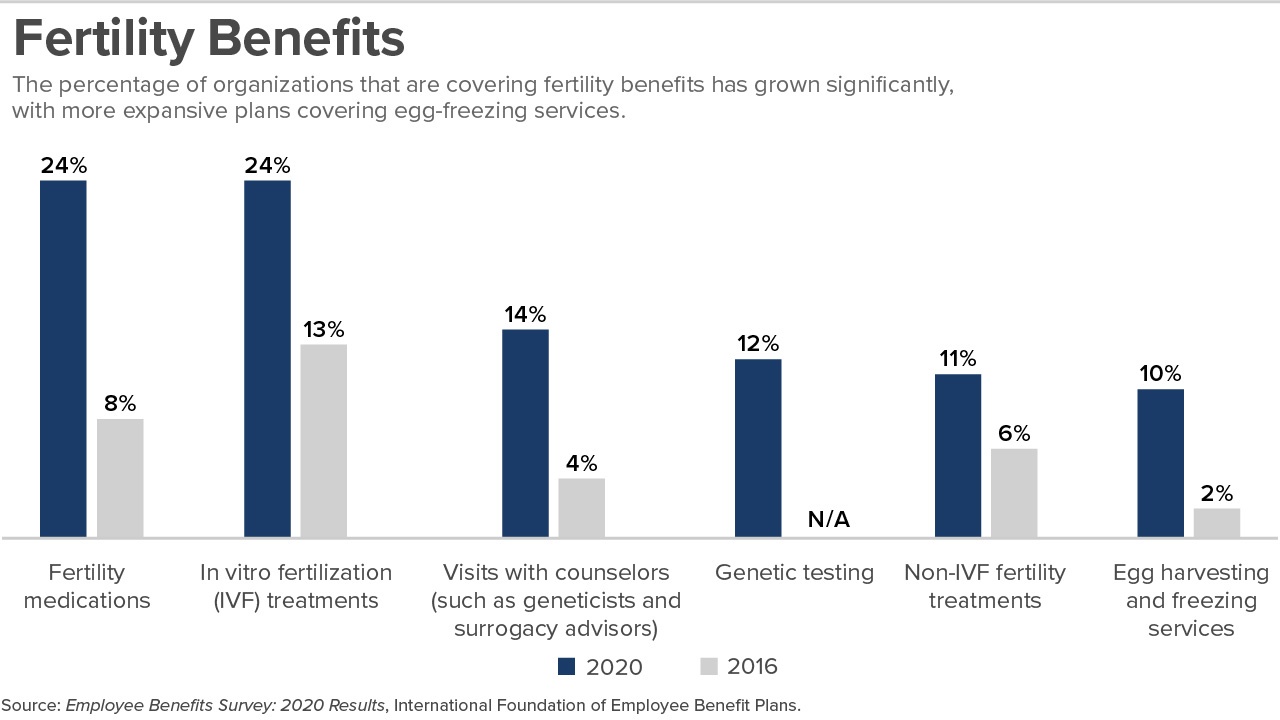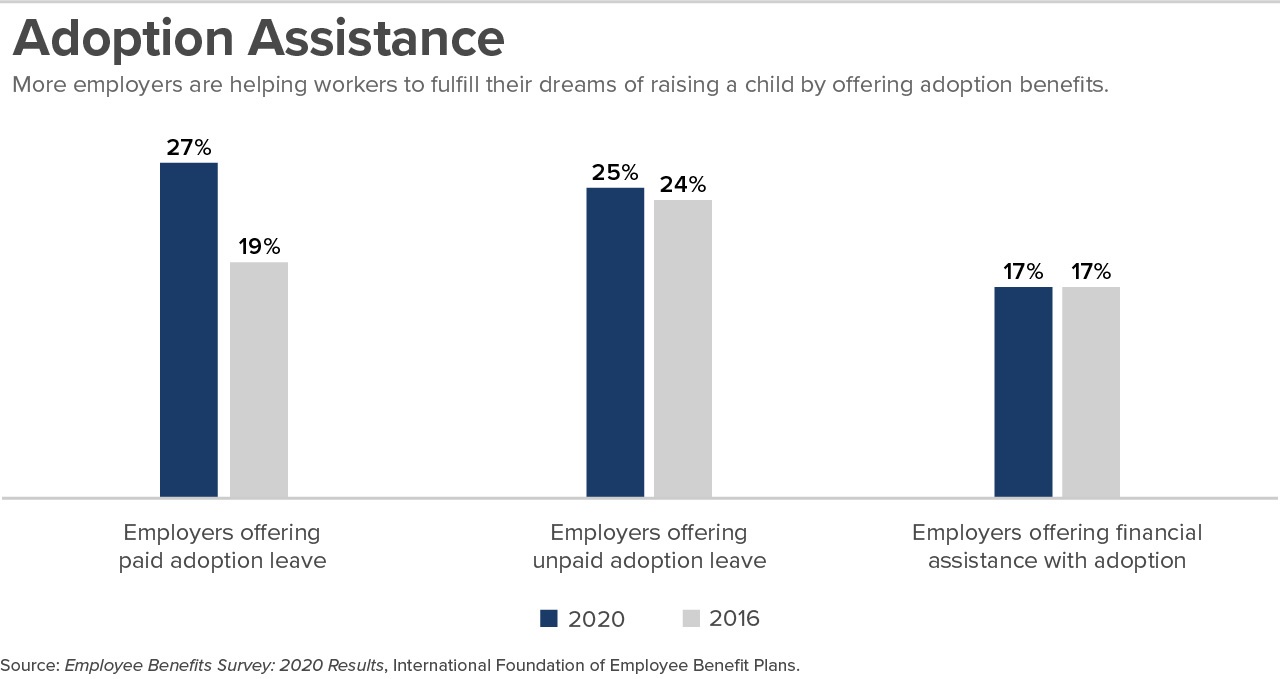Family-Forming Benefits Serve a Diverse Workforce
Employers design benefits to be inclusive of LGBTQ and single prospective parents

The number of employers offering family-forming benefits has grown over the past five years as organizations view these offerings as part of their diversity, equity and inclusion efforts.
Nearly a quarter of U.S. organizations now cover the cost of in vitro fertilization (IVF) treatments and 14 percent provide financial assistance for adoptions, according to the nonprofit International Foundation of Employee Benefit Plans (IFEBP), an employers' group. IFEBP's 2020 Employee Benefits Survey, conducted in August and September, received 752 responses from HR benefits professionals, administrators and industry experts representing a wide range of U.S. organizations. The organization highlighted the findings on family-forming benefits in connection with this year's National Infertility Awareness Week.
Fertility benefits range from infertility diagnosis and medication to IVF and intrauterine insemination. More expansive plans cover egg freezing, the procurement of donor eggs or embryos, and gestational surrogacy.
IFEBP compared survey responses with those from previous benefits surveys it's fielded every other year. The results showed that the percentage of organizations covering fertility treatments within their health plans grew significantly from 2016 to 2020.

The COVID-19 pandemic is likely to have driven up the use of one fertility benefit in particular, according to Julie Stich, vice president of content at IFEBP.
In 2016, she noted, only 2 percent of organizations covered egg harvesting/freezing services. That jumped to 6 percent in 2018 and even higher in 2020, with 10 percent reporting that they cover the benefit.
"Fertility clinics are reporting that egg harvesting and freezing happened more than usual in 2020 because women were putting off having babies, and even dating, during the uncertainties of the pandemic," Stich said.
Adoption Aid
For families looking to adopt, both paid or unpaid leave and financial assistance have trended up over the past few years, Stich noted.
"More employers are supporting employees as they grow their families because they recognize that providing these benefits helps nurture overall happiness and well-being," she said.

An Inclusive Benefit
Offering fertility benefits to all employees, "including LGBTQ and single prospective parents, is a positive way to create a more inclusive workplace," Stich said. "Fertility benefits can be highly valued by talent no matter their gender identity or relationship status."
Victoria Ferrara, founder and legal director of Worldwide Surrogacy Specialists, a surrogacy matching agency, pointed out that "with the recent Supreme Court ruling of Bostick v. Clayton County extending anti-discrimination protection to LGBTQ employees and since the advent of same-sex marriage in 2015, there are record numbers of LGBTQ persons getting married and having children."
She added, "The problem with assisted reproduction, and especially gestational surrogacy utilized by many gay male couples, is the process is expensive. In order to show appreciation for their LGBTQ employees, companies should extend financial assistance to these parents to help them form their families through adoption, surrogacy, IVF and gamete donation. Benefits should include assistance for medical costs, legal costs and time off equivalent to maternity leave."
Fertility benefits are becoming more prevalent overall, but "most obviously among larger employers, who are also offering coverage for fertility preservation," such as egg freezing, said Cary Dicken, MD, a reproductive endocrinologist at RMA Long Island IVF, which has reproductive treatment centers in New York state. "Many of my patients confide in me that their employer's infertility benefits—or lack of benefits—played into their decision to take a new job," she noted, adding that "over time, employers who do not provide infertility benefits may find it difficult to attract young employees."
Case in Point: Kathie Patterson, chief HR officer at Detroit-based Ally Financial, an online financial services company, said the company recognized early on the value of investing in employee benefits innovation, including welcoming and acting on suggestions from its diverse workforce. When members of Ally's LGBTQ workforce suggested the company change its offerings to be more inclusive, "we turned a traditional fertility benefit on its head and considered it from the vantage point of an 'infertility benefit,' shifting the focus from just those with a medical diagnosis to be more inclusive of other ways people may choose to build a family—whether through IVF, surrogacy or adoption," Patterson said. "If you take care of your employees and create an inclusive culture, everything else follows," she added. "We believe that to support our diverse workforce, it's imperative to listen to and work with our 9,700-plus teammates to ensure our benefit offerings reflect their unique needs." In 2020, Ally's medical plan provided coverage for more than 200 individuals who received medical services related to fertility. "We know how important the time immediately after adding a new child is for a family," Patterson said. "We offer 12 weeks of paid parental leave for both parents to care for and bond with a biological, adopted or foster child during the first year following birth or placement." Parents are not required to take this time off sequentially, she pointed out. Instead, "they can use it flexibly throughout the first year of a child's life or adoption." As another family-friendly benefit, new mothers who are breastfeeding can use the company's Milk Stork service to ship milk home while they travel on business, Patterson said. |
"Employers recognize the need for greater diversity and inclusion in the workplace and are taking steps to address equity and access in their benefit programs," said Rachael McCann, senior director, health and benefits, at consulting firm Willis Towers Watson.
Among the 446 employers that participated in the consultancy's 2021 Emerging Trends in Health Care Survey, conducted Feb. 23 to March 12, half (50 percent) have acted on their maternity benefits or family planning and fertility programs. Another 33 percent plan to do so this year or are considering doing so in the next two years.
Employer fertility coverage benefits, on average, are worth about $36,000, according to benefits provider FertilityIQ. Among companies that offer coverage for adoption or foster assistance, the average levels of coverage amounted to around $8,000 per employee.
"For context, while only a few companies (like Nike, Johnson and Johnson, IBM) offered a $20,000 adoption benefit, over 200 companies offered a fertility benefit of the same amount or more," the firm noted.
An organization run by AI is not a futuristic concept. Such technology is already a part of many workplaces and will continue to shape the labor market and HR. Here's how employers and employees can successfully manage generative AI and other AI-powered systems.



